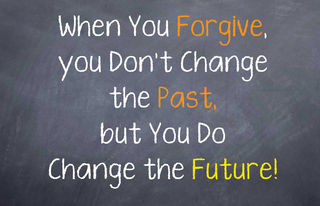Forgiveness
How Do You Forgive Even When It Feels Impossible? (Part 2)
What I hear from people is that certain things seem unforgivable.
Posted May 2, 2016 Reviewed by Ekua Hagan

Someone hurts us in a way that feels irreparable and we say, "I will never forgive you." Someone wounds us emotionally or physically and we think, "That's unforgivable." Yet, we're constantly being told that forgiveness is vital for our mental health. Why?
As a marriage and family therapist, I counsel patients on the ins and outs of forgiveness. Forgiveness is also one of the topics I'm asked about most by readers of my website. What I often hear from people skeptical of forgiveness is that certain things seem unforgivable, certain people don't deserve forgiveness, and that even the concept of forgiveness sounds like very hippy-dippy talk reserved for therapists and spiritual leaders.
I'll explain what I mean when I use the word "forgive," why I recommend the healing power of forgiveness, and how to heal even when you don't feel you can forgive the person who hurt you.
1. What is forgiveness?
Forgiveness is the letting go of a grievance or judgment that you hold against someone else. When you forgive you also let go of feelings of bitterness, resentment, and vengeance.
Many people have difficulty with the word "forgiveness." We imagine forgiveness involves saying, "I forgive you" and includes a hug, pat on the back, or a blessing. That may be true sometimes, but not all the time. Forgiveness doesn't have to involve the other person and it is not for their benefit. (To learn more about what forgiveness is and isn't, please read part one: How Do You Forgive Even When It Feels Impossible?)
If the word "forgiveness" bothers you, you don't have to use it (or you could make up a new one). Processing emotional trauma and releasing old wounds is about more than a single word.
2. Why should I forgive?
Many studies have shown that practicing forgiveness is good for your emotional and physical health (here's one interesting article about the Science of Forgiveness).
Anger, bitterness, hate—these emotions weigh heavily on your body and in your thoughts. When you don't process and release your emotions, they remain trapped inside you and can cause physical ailments like stomachaches and high blood pressure and can worsen depression and anxiety. When you forgive and let go of a grievance, you are freeing your body and your mind. Forgiveness isn't the only way to let go of negative emotions, but it's one of the best.
3. Do I have to forgive?
I believe that forgiveness can be helpful to many and its ability to heal your wounds may surprise you if you try it. But forcing yourself to forgive before you're ready could actually deepen your feelings of trauma and anger. Don't let anyone (including me!) try to convince you to forgive when you're not ready or don't want to. You are not broken just because you aren't ok with forgiving someone else's misdeeds.
4. So, how do I do it?
One simple exercise I do with my patients is a letter-writing exercise. Find a quiet space, some uninterrupted time, and a pen or pencil and paper. Write a letter to the person who hurt you. Write out your feelings, your thoughts, your experiences, and your anger. Remember, this letter is for you. No one else ever has to read it.
Now, try writing a second letter with your other hand. Writing with your non-dominate hand (meaning your left hand if you're usually right-handed) can help override the analytical, judgmental part of your brain. You may find your writing is freer and more emotionally honest this way.
You want to get all the emotions you've bottled up moving and flowing through your pen. Imagine all of your anger and bitterness and resentment and sadness moving from deep inside your body to the page. Even if you don't think you can ever forgive or you don't want to, a writing exercise like this can help you regain some control over disruptive, negative thoughts.
When someone hurt us, it's normal to hold onto feelings of anger and resentment and to want revenge. But, when we cling to our anger because it feels justified, we can't heal. Whether or not you feel that forgiveness can be part of your healing process, the healing process itself is vital. While you heal, keep the focus on yourself. Focus on what you can do to make your life better and more whole.
To learn more about forgiveness and how to live your best life, please visit my website or join me at one of my upcoming Mindful Anger Workshops.




